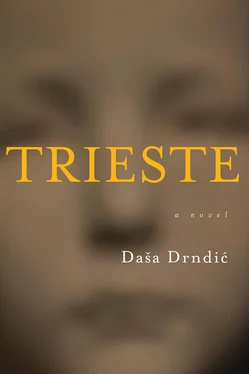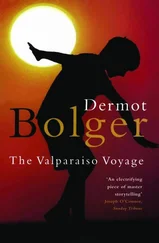A single moment suffices to unlock the secrets of life, and the key to all secrets is History and only History, that eternal repetition and the beautiful name of horror.
— Jorge Luis Borges

For sixty-two years she has been waiting.
She sits and rocks by a tall window in a room on the third floor of an Austro-Hungarian building in the old part of Old Gorizia. The rocking chair is old and, as she rocks, it whimpers.
Is that the chair whimpering or is it me? she asks the deep emptiness, which, like every emptiness, spreads its putrid cloak in all directions to draw her in, her, the woman rocking, to swallow her, blanket her, swamp her, envelop her, ready her for the rubbish heap where the emptiness, her emptiness, is piling the corpses, already stiffened, of the past. She sits in front of her old-fashioned darkened window, her breathing shallow, halting (as if she were sobbing, but she isn’t) and at first she tries to get rid of the stench of stale air around her, waving her hand as if shooing away flies, then to her face, as if splashing it or brushing cobwebs from her lashes. Foul breath (whose? whose?) fills the room, rising to a raging torrent and she knows she must arrange the pebbles around her gravestone, now, just in case, in case he doesn’t come, in case he does, after she has been expecting him for sixty-two years.
He will come .
I will come .
She hears voices where there are none. Her voices are dead. All the same, she converses with the voices of the dead, she quibbles with them, sometimes she slumps limply into their arms and they whisper to her and guide her through landscapes she has forgotten. There are times when events boil over in her mind and then her thoughts become an avenue of statues, granite, marble, stone statues, plaster figures that do nothing but move their lips and tremble. This must be borne. Without the voices she is alone, trapped in her own skull that grows softer and more vulnerable by the day, like the skull of a newborn, in which her brain, already somewhat mummified, pulses wearily in the murky liquid, slowly, like her heart; after all, everything is diminishing. Her eyes are small and fill readily with tears. She summons non-existent voices, the voices that have left her, summons them to replenish her abandonment.
By her feet there is a big red basket, reaching to her knees. From the basket she takes out her life and hangs it on the imaginary clothes line of reality. She takes out letters, some of them more than a hundred years old, photographs, postcards, newspaper clippings, magazines, and leafs through them, she thumbs through the pile of lifeless paper and then sorts it yet again, this time on the floor, or on the desk by the window. She arranges her existence. She is the embodiment of her ancestors, her kin, her faith, the cities and towns where she has lived, her time, fat sweeping time like one of those gigantic cakes which master chefs of the little towns of Mitteleuropa bake for popular festivities on squares, and then she takes it and she swallows it and hoards it, walls herself in, and all of that now rots and decomposes inside her.
She is wildly calm. She listens to a sermon for dirty ears and drapes herself in the histories of others, here in the spacious room in the old building at Via Aprica 47, in Gorica, known as Gorizia in Italian, Görz in German, and Gurize in the Friulian dialect, in a miniature cosmos at the foot of the Alps, where the River Isonzo, or Soča, joins the River Vipava, at the borders of fallen empires.
Her story is a small one, one of innumerable stories about encounters, about the traces preserved of human contact. She knows this, just as she knows that Earth can slumber until all these stories of the world are arranged in a vast cosmic patchwork which will wrap around it. And until then history, reality’s phantom, will continue to unravel, chop, take to pieces, snatch patches of the universe and sew them into its own death shroud. She knows that without her story the job will be incomplete, just as she knows that there is no end, that the end reaches on to eternity, beyond existence. She knows that the end is madness, as Umberto Saba once told her while he was in hospital here, in Gorizia, in Dr Basaglia’s ward perhaps, or maybe it was in Trieste with Dr Weiss. She knows that the end is a dream from which there is no waking. And the shortcuts she takes, the quickest ways to get from one place to the next, are often nearly impassable, truly goats’ paths. These shortcuts may stir her nostalgia for those long, straight, rectilinear, provincial roads, also something Umberto Saba told her then, so she sweeps away the underbrush of her memory now, memories for which she cannot say whether they even sank to the threshold of memory, or are still in the present, set aside, stored, tucked away. It is along these overgrown shortcuts that she walks. She knows there is no such thing as coincidence; there is no such thing as the famous brick which falls on a person’s head; there are links — and resolve — of which we seem to be unaware, for which we search.
She sits and rocks, her silence is unbearable.
It is Monday, 3 July, 2006.
HURRY UP PLEASE IT’S TIME
Her name is Haya Tedeschi. She was born on 9 February, 1923, in Gorizia. Her documents state that she was baptized on 8 April of that same year, in 1923, by Father Aldo Boschin who, of course, she does not remember, just as she has no memory of her godmother, Margherita Collenz. There is also a baptism celebrated by Don Carlo Baubela. Baubela is a German name. She meets Don Carlo Baubela in the autumn of 1944 when he is already old and hunched over and, spreading the fragrance of incense and tobacco with his half-frozen, trembling hands, he gives his blessing. Gorizia is a charming little town. There have been interesting histories in Gorizia, little family histories, like this one of hers. She never met many of the members of her family. She has never even heard of quite a few of them. Her mother’s and her father’s families are large. There are, there were, families in Gorizia with tangled stories, but their stories do not matter, despite the way history has been trailing them along with it for centuries, just as rapids sweep along broken branches wrenched free of the shore, and the carcasses of livestock, their bellies bloated, cows, their eyes glassy, tailless rats, corpses with their throats slit, and suicides. There were no suicides in her family. Or if there were, no-one ever spoke of them to her.
There were several well-known people who lived in Gorizia and committed suicide. Many people passed through Gorizia on the run. Some stayed, some were taken away. Of these some were Jews, some were Gentiles. Of these, some were poets, philosophers and painters. Women and men. The most famous person to commit suicide in Gorizia was Carlo Michelstaedter.
Her mother’s name was Ada Baar…
It took her years to assemble the information from which she tailored her mangled family tree and learned who was what to whom. For a long time now she has had no-one to ask. Those who remain are few, and their memories are blotted, full of gaps, covered with the black stamps of oblivion or contention and like little islands engulfed in towering flames — they shimmer, elusive. The dead voices of her ancestors shudder, whimper, well up from the corners of the room, from the floor, the ceiling, they creep in through the Venetian blinds and hum history just beyond her reach.
Читать дальше













